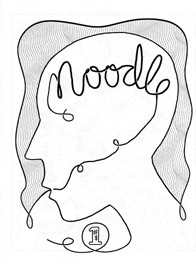 the galapagos finch is an icon of darwin's theory of natural selection and remains a favorite to study. every year since 1973, members of that bird population, both parents and chicks, on the island of daphne major, have been weighed, measured and marked. their survival depends largely on their ability to open pods for seeds. in years of abundance, all birds thrive, but if the season is scarce, smaller beaked-birds die in droves, taking their puny genes with them.
the galapagos finch is an icon of darwin's theory of natural selection and remains a favorite to study. every year since 1973, members of that bird population, both parents and chicks, on the island of daphne major, have been weighed, measured and marked. their survival depends largely on their ability to open pods for seeds. in years of abundance, all birds thrive, but if the season is scarce, smaller beaked-birds die in droves, taking their puny genes with them.over the course of 3 decades, annual measurement of finches shows that both body size and beak size evolved significantly, but they didn’t do so in a smooth, consistent fashion. instead, natural selection jittered about, often changing direction from one season to the next. as the abundance of different seeds fluctuated, so too did the beak sizes. however, if the measurements had been taken once every 10 years, or only then and now, the changes in beak size would have been wildly underestimated.
as part of my recent quest for better health, i keep stumbling upon the paleo-diet. in a nutshell, you eat what oog the caveman did. (stop snorting with laughter, please.) i appreciate the intent, but struggle both with the execution and the "i drank the kool-aid (or antelope marrow)" mania. the theory is to consume only what would have been available to our bipedal ancestors before farming and animal husbandry changed the menu. they bolster their argument with studies of modern hunter/gatherer tribes, the older members of which show no evidence of heart disease, osteoporosis, hypertension, tooth decay and general western-type age-related maladies. supposedly accidents and infections killed off most of them, while the less clumsy spent their dotage eating berries and sleeping alot.
day in the life: slow amble through latest leafy glade, bending or stretching to gather roots, fruits, seeds, leaves, etc. piling that all up in a basket of some sort, then hauling that load back to base. maybe a stroll with some pointy sticks to a nearby stream bed or shoreline for trout or pike. the occasional big romp to take down a beast. (the raw foodists tend to diverge off the path prior to the campfire/meat part, but i digress.)
i read "clan of the cave bear", too, ok? lots of all that sounds pretty groovy and peaceable, and supposedly a good amount of time was spent together in your little gang, relaxing and bonding, living your day with the cycle of the sun. naps were big, too, lol.
estimates are that these early folks accessed about 400-500 different edibles over the course of 4 seasons. we evolved with a simple gut that allows us to be omnivores. it was necessary for survival, ne c'est pas? contrast this with modern man? while our supermarket aisles groan with bags and boxes (10,000 new processed food products are introduced every year in the u.s.!!!) average joe eats a only a handful of foods, mostly grain, lots of fat and stuff nobody can pronounce.
what about the finches you ask? lol. what flies in the face of the paleo-proponents is the presumption that our bodies haven't changed in all this time. that smacks of stoopidly ignoring science. finches evolve flibbity-jibbity in a generation, but man hasn't shifted a midge in millions of years? we have been farming and herding for 10,000 years, but cooked lentils and cheese are toxic?
i'm not prepared to completely toss the genetic baby out with the bean cooking water. only 3 generations ago, my people were from places too poor to keep cows. sheep's milk wasn't really a *thing*, and hard cheese became a condiment, rather than a staple. nobody in my family drinks milk, we all hate it. even the feel of it on my tongue grosses me out. babies and small children have a digestive enzyme for milk proteins. unless kept active, that enzyme goes the way of baby teeth. on a date many years ago, he insisted we have ice cream. "sure, i haven't had it in ages." within hours, it was like food poisoning. i was in a fetal position in the back of the car and spent 12 hours wanting to die.
the other genetic contradiction here is the presumption that the plants and animals of long ago are the same as what we today buy shrink-wrapped and plu-stickered. even if i kept my own garden, my fruits and tubers would be very different than what those folks picked and scratched.
"eat food. not too much. mostly plants." ~~ michael pollan, "the omnivore's dilemma"
it's laugh out loud easy, isn't it?
i'm trying. here -- have some parsley salad. :)


No comments:
Post a Comment